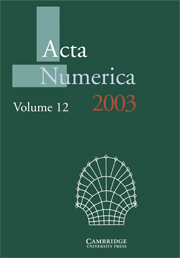Book contents
- Frontmatter
- Contents
- Survey of meshless and generalized finite element methods: A unified approach
- Continuous dependence and error estimation for viscosity methods
- Computational high frequency wave propagation
- Model reduction methods based on Krylov subspaces
- A mathematical view of automatic differentiation
- Geometric numerical integration illustrated by the Störmer–Verlet method
- Entropy stability theory for difference approximations of nonlinear conservation laws and related time-dependent problems
Entropy stability theory for difference approximations of nonlinear conservation laws and related time-dependent problems
Published online by Cambridge University Press: 07 September 2010
- Frontmatter
- Contents
- Survey of meshless and generalized finite element methods: A unified approach
- Continuous dependence and error estimation for viscosity methods
- Computational high frequency wave propagation
- Model reduction methods based on Krylov subspaces
- A mathematical view of automatic differentiation
- Geometric numerical integration illustrated by the Störmer–Verlet method
- Entropy stability theory for difference approximations of nonlinear conservation laws and related time-dependent problems
Summary
We study the entropy stability of difference approximations to nonlinear hyperbolic conservation laws, and related time-dependent problems governed by additional dissipative and dispersive forcing terms. We employ a comparison principle as the main tool for entropy stability analysis, comparing the entropy production of a given scheme against properly chosen entropyconservative schemes.
To this end, we introduce general families of entropy-conservative schemes, interesting in their own right. The present treatment of such schemes extends our earlier recipe for construction of entropy-conservative schemes, introduced in Tadmor (1987b). The new families of entropy-conservative schemes offer two main advantages, namely, (i) their numerical fluxes admit an explicit, closed-form expression, and (ii) by a proper choice of their path of integration in phase space, we can distinguish between different families of waves within the same computational cell; in particular, entropy stability can be enforced on rarefactions while keeping the sharp resolution of shock discontinuities.
A comparison with the numerical viscosities associated with entropy-conservative schemes provides a useful framework for the construction and analysis of entropy-stable schemes. We employ this framework for a detailed study of entropy stability for a host of first- and second-order accurate schemes. The comparison approach yields a precise characterization of the entropy stability of semi-discrete schemes for both scalar problems and systems of equations. We extend these results to fully discrete schemes. Here, spatial entropy dissipation is balanced by the entropy production due to time discretization with a sufficiently small time-step, satisfying a suitable CFL condition.
- Type
- Chapter
- Information
- Acta Numerica 2003 , pp. 451 - 512Publisher: Cambridge University PressPrint publication year: 2003
- 14
- Cited by

